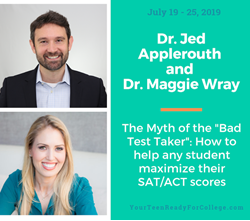Applerouth on Changes in College Admissions
That changing face of higher education has been a big topic for Applerouth, who spoke about his advice for parents and students going through the college admissions process.
When Jed Applerouth, founder and president of Applerouth Tutoring, applied to school, he only sent one application.
“I applied to one college, Penn [University of Pennsylvania], and didn’t do another application,” he said. “Today you just can’t do that. When I applied, the acceptance rate was in the 30s and this year it was 7.44 percent.”
That changing face of higher education has been a big topic for Applerouth, who spoke to the AJT about his advice for parents and students going through the college admissions process.
Applerouth explained that the landscape of education in Georgia has seen a dramatic shift since the advent of the HOPE Scholarship in 1993.
“In 1993 I knew one person who did test prep, and now it’s ubiquitous. University of Georgia was a backup school and now it’s a reach for many students,” he said. “The HOPE Scholarship has really changed the face of education in Georgia.”
Penn and UGA are far from the only schools to see acceptance rates plummet, and with those lower rates come higher expectations and demands on students, among them, Jewish high schoolers.
“It’s really about class, rather than just Jewish students, and there are definitely pressures that exist in high-net-worth communities, especially those coming from families with higher levels of education,” he said.
Applerouth pointed out that often when high schoolers are visiting relatives, one of the first questions out of their mouths is: “Where are you going to college?”
“That conversation can definitely add to the stress,” he said. “Their identities are often tied to academic performance, and so the outcomes are often more important, and more pressure is placed on doing well.”
And while the pressure comes from families and schools, Applerouth noted that the causes of stress for students can differ drastically.
“It varies a lot by the family. Certain parents are much more laissez-faire and others are much more involved,” Applerouth emphasized. “I work with a lot of independent college counselors, and some parents are hyper-involved to where it can be a problem.”
Peer-to-peer stress is also a problem for these students, especially high school girls.
“It’s an interesting gender thing to note, but they’re more concerned with the comparison than male students,” he said. “They’re more aware of their place in the hierarchy.”
Applerouth also addressed a recent headline-grabbing topic, the SAT’s new adversity score, which College Board says measures “disadvantage.”
“We had the announcement in the spring and we’re trying to tease out how much it matters. We have schools like Yale saying they use it in every application, but schools have always had access to this kind of information,” he said.
While he noted that it was unlikely to overwhelmingly benefit Jewish students, who more often come from higher income brackets, it isn’t something that should really concern parents or students.
“It’s profoundly premature to worry about it,” he said.
Among topics Applerouth discussed with the AJT was standardized testing. He gave a recent online interview with academic life coach Maggie Wray titled “The Myth of the Bad Test Taker,” which aired July 23-25.

“With every new batch of kids I hear, ‘my kid is not a good test taker,’ and I want to poke holes in that. I don’t believe it,” he said. “Everybody can become better and markedly better at mastering [tests] by learning the language and content.”
He explained that often parents come in with the notion of a bad test taker in their head, and he instructs them to remove the phrase from their vocabulary.
Applerouth shared a few quick tips to improve test-taking ability:
• Be willing to change your mindset: “This process requires a growth mindset, and bad thoughts can loom and dominate and will impact your performance.”
• Provide mastery experiences: “Practice tests are great but make sure to go over what was missed and why it was missed. Why did I choose the wrong answer? What trap did I fall in?”
• Pacing is vital: “The same mastery applies to pacing, and that’s the joy of practice tests; you can practice more than just content.”




comments